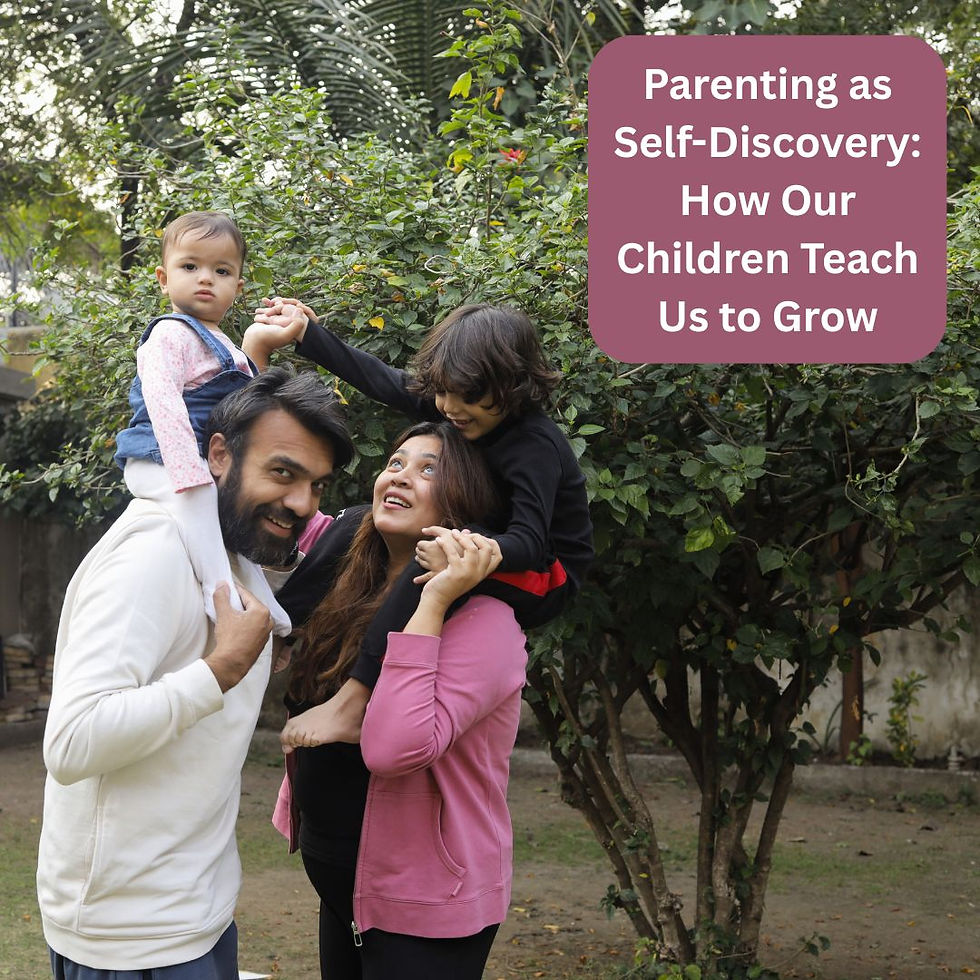Parenting Archetypes: Discovering Timeless Wisdom in Modern Families
- Team Playfull

- Jun 15, 2025
- 4 min read
Updated: Jul 10, 2025
Table of Content
Introduction
Have you ever wondered if your parenting style mirrors ancient wisdom passed down through generations? Do you sometimes feel like you're playing the role of a protector, guide, or nurturer without consciously planning it?
Parenting today can feel overwhelming with endless advice and evolving trends. Yet, timeless archetypes—patterns rooted in human history—may hold the answers parents need to navigate modern challenges with confidence.
This blog explores parenting archetypes, their relevance in modern families, and how identifying your archetype can help you embrace your strengths while addressing gaps. Whether you're a nurturer, teacher, or explorer, you'll gain insights into how your natural instincts shape your child's development.
Curious about your parenting archetype? Take the Parenting Styles Test at the end of this blog to uncover your unique style!
Why It Matters
Parenting archetypes aren’t a new concept. Throughout history, societies have relied on recognizable roles—protectors, healers, mentors—to raise the next generation. These archetypes reflect fundamental human instincts, ensuring survival, learning, and emotional bonding.
Modern psychology reinforces these patterns. Carl Jung’s theory of archetypes highlights recurring symbols and roles that shape human behavior. Studies show that identifying such roles can lead to better self-awareness and parenting effectiveness.
Imagine the comfort of recognizing yourself as a guide who thrives on teaching your child or as a nurturer who fosters emotional security. These archetypes don’t box you in; instead, they illuminate natural tendencies you can build upon.
Key Insights
Parenting archetypes can be grouped into roles like the Nurturer, the Teacher, the Protector, and the Explorer. Each role brings strengths and challenges that influence how parents interact with their children.
The Nurturer:
Focuses on emotional bonding and creating a safe space. Nurturers often prioritize empathy and affection but may struggle with enforcing boundaries.
The Teacher:
Values knowledge and guidance, often helping children build skills and understand concepts. Teachers may need to balance structure with flexibility.
The Protector:
Ensures safety and security, focusing on preparedness and defense. Protectors may need to let go of control to encourage independence.
The Explorer:
Encourages curiosity, adventure, and discovery. Explorers foster creativity but may need to address consistency and routine.
Imagine a Nurturer comforting a child after a rough day, a Teacher explaining life lessons through stories, or an Explorer inspiring curiosity by engaging in nature walks.
Psychologists suggest that most parents embody multiple archetypes, adapting to circumstances. Parenting expert Dr. Laura Markham notes that recognizing dominant traits allows parents to play to their strengths while addressing gaps.
Parenting Archetypes Tools and Reflection – Actionable Steps
Understanding your dominant parenting archetype can be transformative. Take time to reflect on the following questions:
What values do I prioritize most in my parenting?
How do I typically respond to my child’s emotional needs?
When faced with challenges, do I protect, teach, comfort, or explore solutions?
Parenting Exercises:
Journal Exercise: Record daily interactions with your child and identify recurring themes that reflect your archetype.
Role Reversal: Ask your child how they perceive you as a parent. Do they see you as someone who protects, nurtures, or inspires them?
Vision Board: Create a visual representation of your parenting goals and strengths to guide intentional growth.
Parenting Compass:
The Parenting Compass, helps align your actions with values:
North: Security and stability (Protector).
South: Emotional connection (Nurturer).
East: Knowledge and guidance (Teacher).
West: Exploration and creativity (Explorer).
Using this compass, you can consciously shift between roles as needed.
Overcoming Challenges
Common Mistakes
Even the most well-intentioned parents face challenges tied to their archetypes:
Nurturers: Over-protecting or shielding children from failure may hinder resilience.
Teachers: Overloading children with information can lead to burnout or overwhelm.
Protectors: Being too controlling might stifle independence and creativity.
Explorers: Lack of structure can create instability or confusion.
Solutions
For Nurturers: Encourage independence by gradually stepping back while still providing emotional support.
For Teachers: Balance teaching moments with free play to allow organic learning.
For Protectors: Focus on empowering children to make safe decisions rather than enforcing strict rules.
For Explorers: Introduce flexible routines to balance spontaneity with consistency.
Success Stories
Mahatma Gandhi: Gandhi's approach combined the archetypes of Teacher and Protector. He emphasized values through lessons of non-violence and responsibility, guiding his children to develop strong moral character.
Rabindranath Tagore: Tagore blended the Explorer and Teacher archetypes, promoting creativity and open-mindedness through experimental education at Shantiniketan.
The Mother and Sri Aurobindo: Their teachings integrated nurturing spiritual growth and independence, embodying the Nurturer and Guide archetypes to raise conscious beings prepared for a balanced life.
Conclusion and Takeaway
Parenting archetypes provide timeless wisdom that modern parents can rely on to create balanced, intentional, and nurturing environments for their children. Recognizing these roles helps parents amplify strengths while addressing areas for growth.
What archetype resonates most with your parenting style? How can you adapt and balance different roles to meet your child’s needs?
Every parent carries elements of multiple archetypes. Embracing this diversity allows you to grow alongside your child, building stronger bonds and lifelong values.
Ready to uncover your unique parenting style? Take the Parenting Styles Test now and embark on your journey to intentional parenting!




Comments